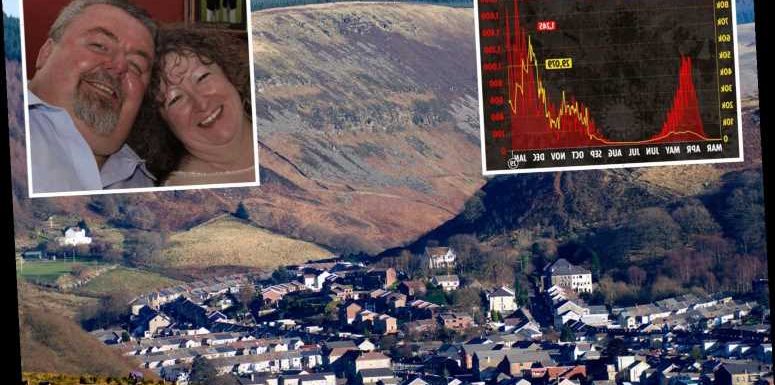
A COUNTY in Wales has a Covid death rate which is TWICE the national average – making it Britain's deadliest coronavirus hotspot.
Rhondda Cynon Taf – the Welsh valleys county which is home to almost a quarter of a million people – has found itself at the centre of the Covid storm.
? Read our coronavirus live blog for the latest news & updates
Known for its mining and manufacturing industries, the county is now facing a Covid crisis where "everyone" knows someone that's suffered with the virus.
Rhondda Cynon Taf currently has a death rate of 283 per 100,000 people – which is nearly twice the Welsh average of 148 and the UK's average of 156.
In Aberdare, two of the town's most popular and much-loved pub landlords died from the virus this month.
John Evill and his wife Gail, who ran the Conway Inn, were both admitted into hospital around Christmas after their oxygen levels dropped.
They tragically both died within two weeks of one another in January.
Mum-of-five Debbie Mountjoy, 42, lost three members of her family in the space of just five days.
Her mother, Gladys Lewis, 74, fell ill on October 18 at her home in Treorchy – and Debbie held her hand as she died two days later.
The next day, Debbie answered a frantic knock at her door to find her nephews – who lived in the flat above her – screaming for help.
Debbie’s older brother Dean, 44, had Covid and was coughing so hard that it caused a heart attack.
The heartbroken mum told The Mirror: "I gave him CPR but he had another attack in the ambulance and died.”
EYE OF THE STORM
The same day, Debbie's younger brother Darren, 42, who had Down Syndrome was admitted to the Royal Glamorgan Hospital with Covid, and later died.
Says Debbie: “By this time I’d tested positive myself so couldn’t even go and visit him.
"When the end came I had to say goodbye via a video link. I just have to hope he could hear me.”
Locals have said that everyone knows someone who has been ill – adding that there's probably not many people left who haven't been infected.
Nicola Ward, who works at the high street florist which posts funeral notices in the window, said that before the pandemic there would be maybe one or two out at the same time.
But just a week ago, there were 13 notices in the window at the same time.
Another local, Martine Harris, added: "We’ve been hit hard because it’s a close community.
“There’s a lot of elderly around here too so everyone is trying to look for each other.
“We have to because people living in the valleys have always fallen through the gaps.
"I know five people who’ve died, people who’ve been around since I was little. They had years ahead of them.
“We can’t attend the funerals because they’re restricted, so we all tend to go out in the street when a hearse goes past just so the family knows they are in our thoughts."
COVID CRISIS
Labour MP for Rhondda Chris Bryant has said he believes the area's poverty and years of neglect are a root cause of the soaring death toll.
He said: "Look at towns like Ferndale, Maerdy and Tylorstown which have the highest levels of deprivation and have had the highest levels of death.
“I’m absolutely certain that the two are linked because with deprivation comes poor health – heart disease, diabetes, pulmonary disease – historically from the mines or from smoking – obesity, poor diet. All those things.”
Yesterday, official daily figures released show the UK recorded 29,079 Covid cases in 24 hours- with another 1,245 fatalities reported.
Cases have plunged 28 per cent on the 40,261 infections recorded a week ago.
The seven-day average was around 60,000 cases a day on January 9 but is now less than half of that at around 27,000.
Yesterday's figures also represent an eleven per cent drop in deaths on the 1,401 fatalities recorded last Friday.
The number of patients in hospital and fighting for life on ventilators has also fallen this week.
The figure peaked at 39,204 on January 18 and now stands at 35,375.
The number of ventilators being used on Covid patients peaked at 4,077 on January 24 and is currently 3,918.
Source: Read Full Article





